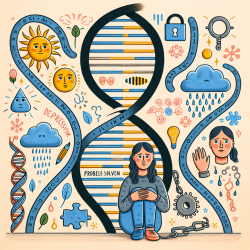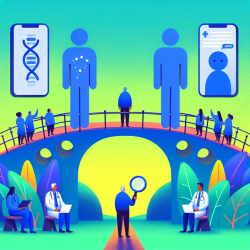Unveiling the Genetic Connection: APOE Gene's Role in Mental Health Among Hispanics
As practitioners dedicated to improving outcomes for children and adults alike, understanding the genetic underpinnings of mental health conditions is crucial. The recent study titled APOE Gene Associated with Dementia-Related Traits, Depression, and Anxiety in the Hispanic Population sheds light on the significant role of the APOE gene in influencing these conditions within the Hispanic community. This blog aims to distill the key findings and implications of this research, encouraging practitioners to integrate these insights into their practice or pursue further research.
Understanding the APOE Gene
The APOE gene is known for its three alleles: ε2, ε3, and ε4. While the ε3 allele is the most common, the ε4 allele has been associated with increased risks for Alzheimer's disease (AD) and, as this study reveals, also with anxiety and depression. The study involved 1,382 Hispanic participants and utilized data from the Texas Alzheimer’s Research and Care Consortium and the Initial Study of Longevity and Dementia from the Rio Grande Valley.
Key Findings of the Study
- The APOE-ε4 allele is significantly associated with increased risks for AD, anxiety, and depression in the Hispanic population.
- APOE-ε3, while prevalent, also showed an association with depression.
- The prevalence of APOE-ε4 among Hispanic participants was lower compared to other ethnic groups, yet it still posed a significant risk factor.
Implications for Practitioners
For speech-language pathologists and other healthcare providers, these findings underscore the importance of considering genetic factors when assessing and treating mental health conditions. Here are some actionable steps:
- Genetic Screening: Consider advocating for genetic screening in patients with a family history of AD, anxiety, or depression, especially within the Hispanic community.
- Early Intervention: Utilize these genetic insights to inform early intervention strategies, potentially mitigating the progression of these conditions.
- Collaborative Care: Work closely with genetic counselors and other healthcare providers to develop comprehensive care plans that address both genetic and environmental factors.
Encouraging Further Research
The study's authors emphasize the need for further research to confirm these findings and explore the mechanisms by which the APOE alleles influence mental health. Practitioners are encouraged to contribute to this body of research, whether through clinical trials, observational studies, or collaborations with genetic researchers.
To read the original research paper, please follow this link: APOE Gene Associated with Dementia-Related Traits, Depression, and Anxiety in the Hispanic Population.
By integrating these genetic insights into practice, we can enhance our understanding of mental health conditions and improve outcomes for our patients, particularly within the Hispanic community. Let's continue to leverage data-driven decisions to make a meaningful impact.










